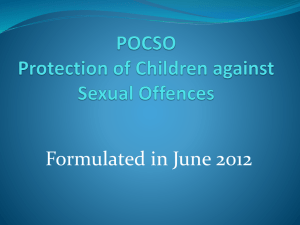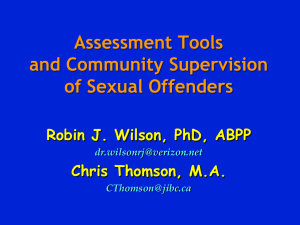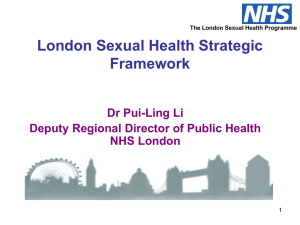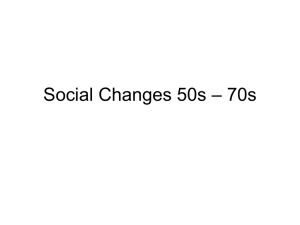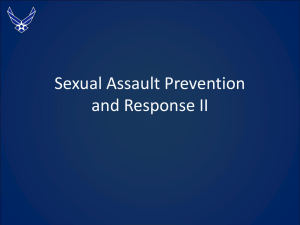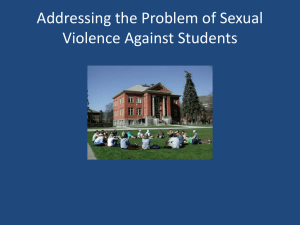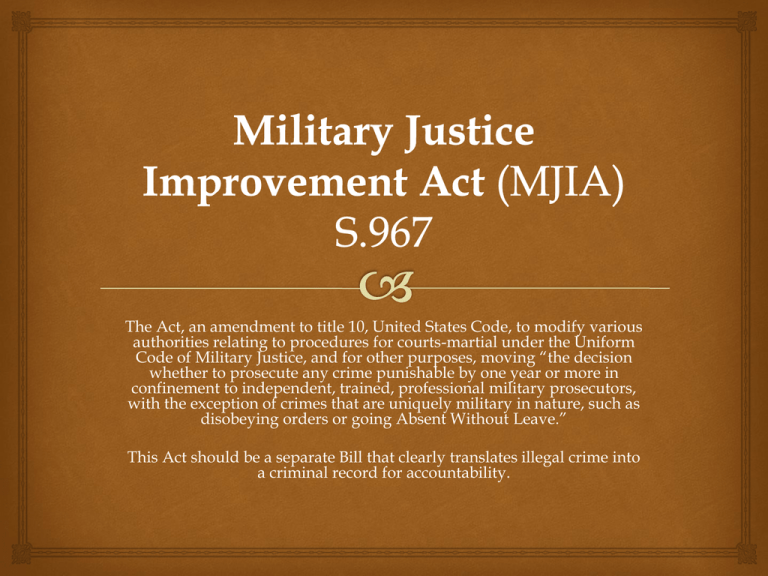
The Act, an amendment to title 10, United States Code, to modify various
authorities relating to procedures for courts-martial under the Uniform
Code of Military Justice, and for other purposes, moving “the decision
whether to prosecute any crime punishable by one year or more in
confinement to independent, trained, professional military prosecutors,
with the exception of crimes that are uniquely military in nature, such as
disobeying orders or going Absent Without Leave.”
This Act should be a separate Bill that clearly translates illegal crime into
a criminal record for accountability.
Policy Lightning
+Increasing number of rapes
reported by the Pentagon.
+The Invisible War
documentary and an expanding
dialogue about gender,
sexuality, and rape –even within
the context of the military
(decreasing stigma)
+Tragedies that make the news:
Tailhook and Aberdeen
Statistical Information
The Pentagon has determined that the rate of female victims victimized in
sexual assaults went from roughly 1-in-26 to 1-in-16 between the 2010
study and 2012. The majority of reports come from women.
An anonymous sexual abuse survey concluded that 26,000 service members
were victims in 2012. Roughly 14,000 of the victims were male and 12,000
female, according to the Pentagon.
Male victims may be more likely to report sexual offenses in the absence of
the former Don’t Ask, Don’t Tell policy since troops no longer have to fear
being removed from the military if it is discovered that they are gay.
Survivors of sexual assault say they do not report the crimes because they
do not believe the perpetrators will be prosecuted. Eventually, many report
sexual assault after seeking help from the VA. Well over half of those the
VA sees for PTSD have suffered a sexual assault.
The Matter of Justice
Only about 8 percent of the cases went to court-martial (a
judicial court for trying members of the armed services accused
of offenses against military law). The majority of reports are
from women.
The majority of assailants were given what the Pentagon calls
“non-judicial punishments, administrative actions and
discharges” but no criminal record. By contrast, in civilian life,
40 percent of those accused of sex crimes are prosecuted.
(The Pentagon’s 2007 Annual Report on Sexual Assault in the
Military)
New System
Current System
The MJIA Changes
Unrestricte
d report of
sexual
assault
Unrestricte
d report of
sexual
assault
Military
Criminal
Investigative
Organizatio
n notified
and
investigation
completed
Military
Criminal
Investigative
Organizatio
n notified
and
investigation
completed
Results of
investigatio
n sent to
Staff Judge
Advocate
Results of
investigatio
n sent to
experienced
prosecutor
Staff Judge
Advocate
advises
commander on
the facts of the
case and gives
recommendation
on proceeding to
court martial
*Experienced
prosecutor
who is not in
the chain of
command of
the victim or
the accused
reviews the
evidence
Commander
decides if
trial proceeds
to court
martial
Experienced
prosecutor
decides if trial
proceeds to
court martial
*Only applies to offenses that are not excluded as uniquely military and are punishable by more than one year of
confinement. All excluded offenses will still be handled by the chain of command.
If yes, then
the
commander
convenes the
court martial
If yes, then
the Service
Secretary’s
office assigns
independent
O-6 to
convene the
court martial
Ideally, Why Remove Command?
“The far-reaching role of commanding officers in the courtmartial process remains the greatest barrier to operating a fair
system of criminal justice.” (Cox Commission, a panel formed
on the 50th anniversary of the UCMJ in 2001)
Civilian world: prosecutors decide whether to investigate and
try accused offenders.
Military: soldiers’ bosses—commanders—make those decisions.
The philosophy behind this post-WWII system is to keep
soldier in line so they know they must answer to superiors.
Serial offenders can resign with administrative punishments.
They then slip back into the civilian world with no criminal
record.
The attitude of command is a large part of the problem. Is it the
solution?
Policy: The Military Justice Improvement Act
& Division in the Ranks
Senator McCaskill: military commanders need to be part of the effort to combat
sexual assaults and that removing them from the process could hurt attempts to
combat the problem. (supported by Congressman Levin, Senate Armed Services
Committee)
Senator Gillibrand: strip military commanders of the authority to decide whether
sexual assault cases can go forward, handing that power to military prosecutors
instead. (supported by Congressman Harry Reid, the U.S. Senate Majority Leader)
The NDAA (without MJIA) includes a number of changes already, like taking away
commanders’ power to overturn convictions, removing statute of limitations (limited
time) for court martial proceedings on sexual assaults, and provisions to make sure
victims have access to legal counsel.
Sen. McCaskill said the focus on certain policy disagreements shouldn’t take away
from the broader effort to address the problem of sexual assaults in the armed
services.
The Politics Trade-Off
Supporting Victims/Survivors
In the Military
The Policy Trade-Off…
The Costs to Command
Authority
Senator McCaskill, Levin, DOD
Senator Gillibrand, Reid,
Advocacy Groups
The Costs to Command
Authority
The Costs to Command
Authority
The Military Justice Improvement Act
Should be Stand-Alone Legislation
Senator Gillibrand should maintain the momentum behind this legislation as a
separate bill and review it accordingly. I think she should ensure clear procedure for
sexual assault and a criminal record.
Failure to enact the NDAA by Dec. 31 would result in a suspension of combat pay,
loss of federal "impact aid" to school districts located near military bases, suspension
of work on the Navy's newest aircraft carrier and a halt to military housing
upgrades.
It also would prevent enactment of military justice reforms by Senator McCaskill
Among the defense bill's various proposals related to sexual assault cases,
Gillibrand's was the only one that divided senators.
Her proposal is firmly opposed by military leaders and a majority of senators on the
Armed Services Committee, indicating that applying the policy would be difficult
and prove ineffective.
Slow to Change
In 1994, Congress required the military to set up advocacy programs, but
the majority lack installation and victim advocates. Advocacy groups have
advised the military to address the shortage. However, more soldiers are
coming forward every year to report sexual assault. The silent epidemic is
becoming “louder.”
The majority of cases the Miles Foundation has handled, the assailant had
a higher rank. Even when cases are prosecuted, military rape victims say
that they face mistreatment from commanders and others. Senator Claire
McCaskill’s work seeks to break down the “psychological warfare” that is
part of the context of order and command.
Reform takes time. Social pressure will continue. It is important to push for
incremental change that the military supports and can implement with
command support. The NDAA should pass with tremendous support for
McCaskill’s reforms, and the MJIA should become a bill with deeper roots
of coalition that will ensure unity for justice reform.

